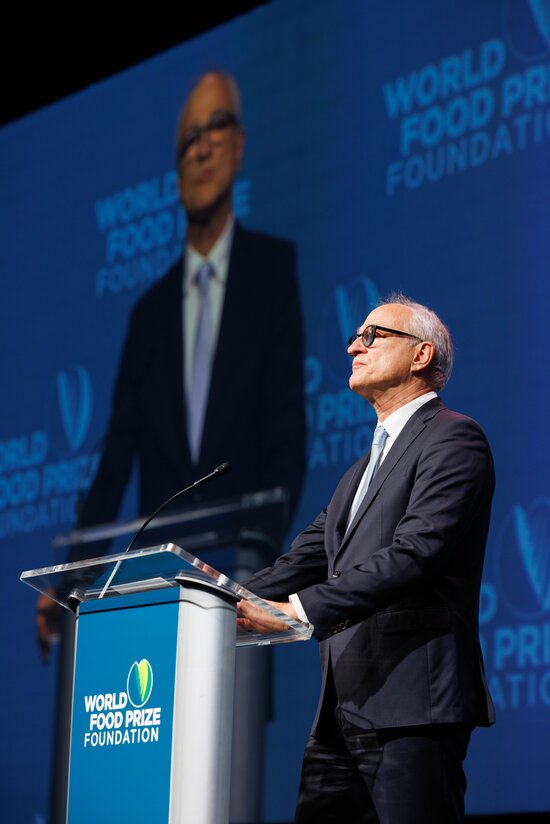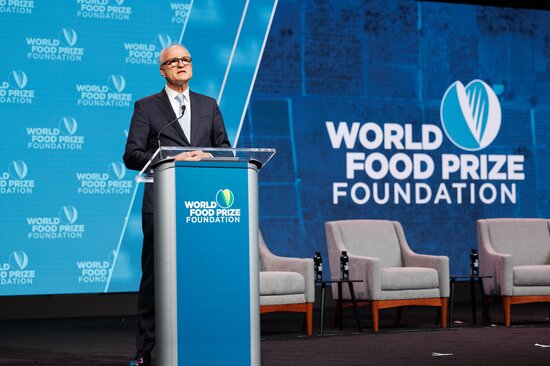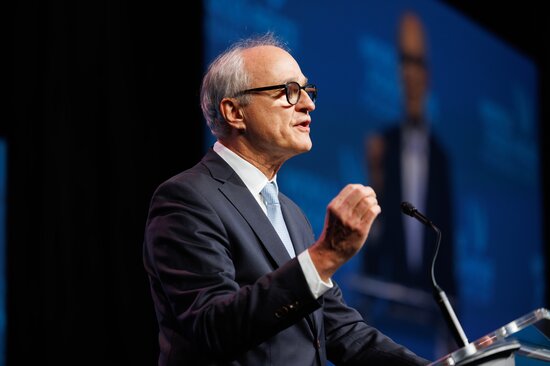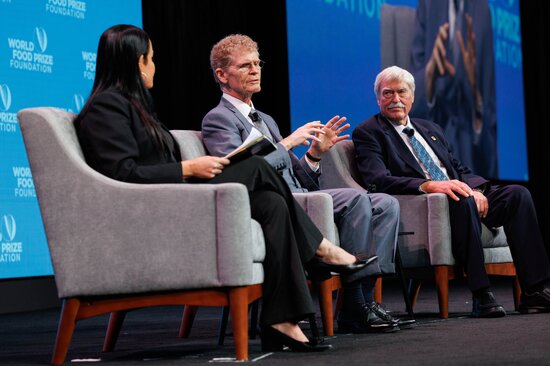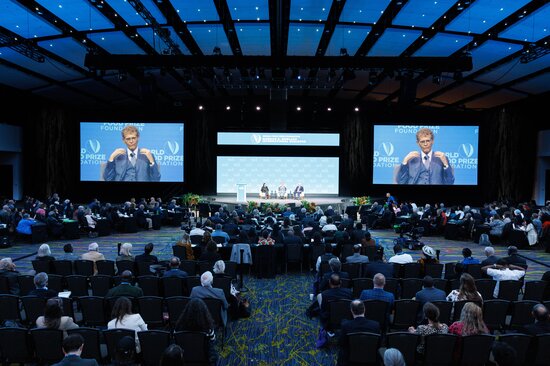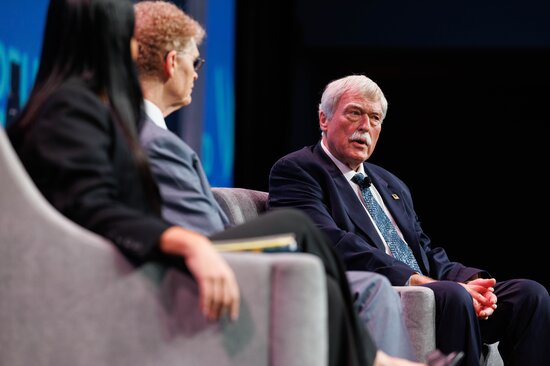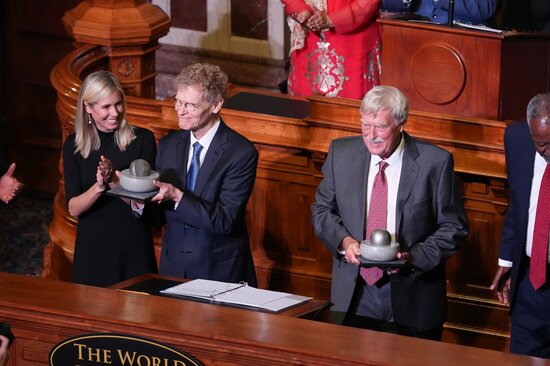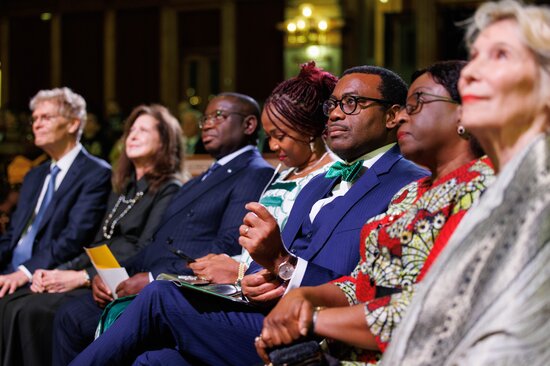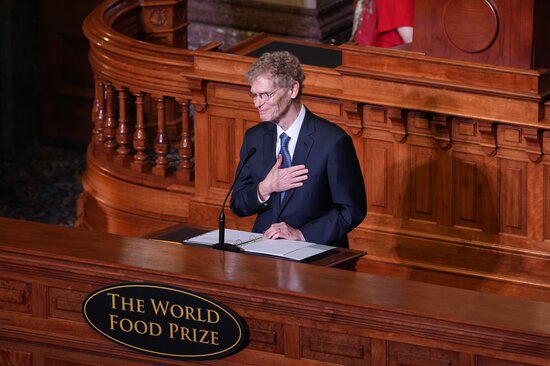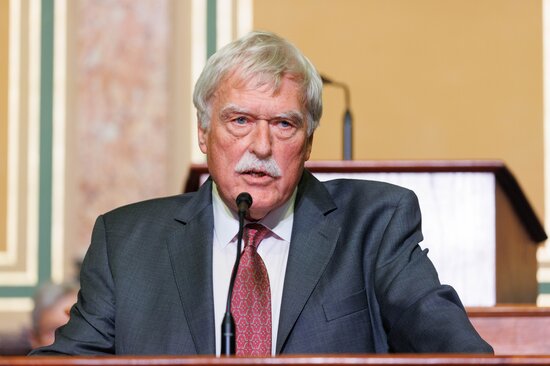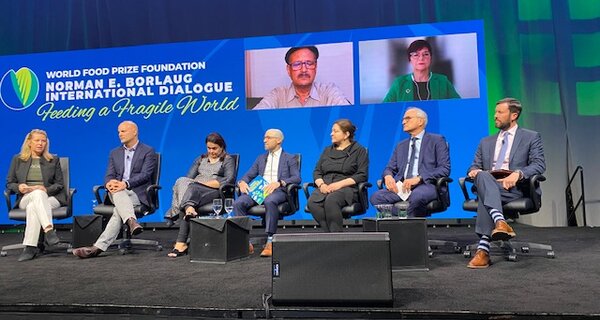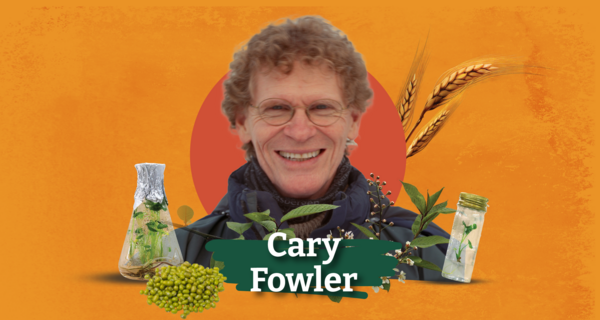Crop Trust at the World Food Prize Borlaug Dialogue
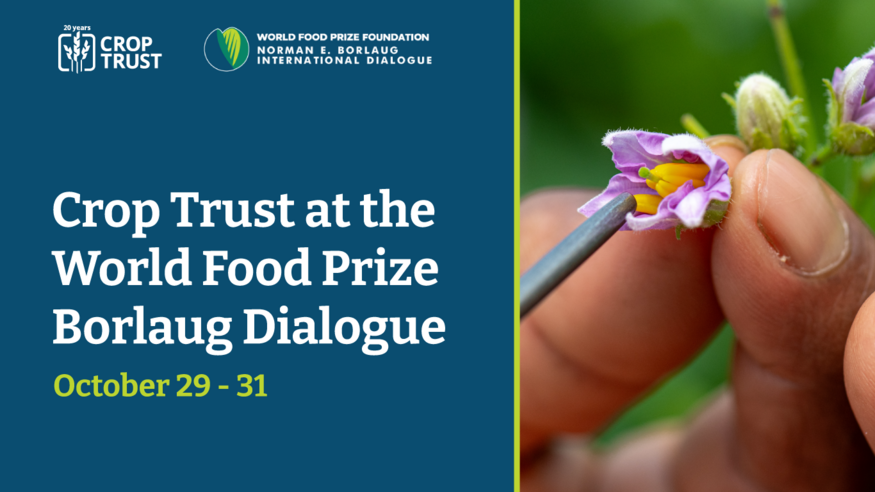
29 October 2024
Every year, leaders and influential individuals in global agriculture meet in Des Moines, Iowa, USA, to recognize the winner of the World Food Prize and participate in the Borlaug Dialogue.
The Borlaug Dialogue brings together decision-makers, farmers, experts and young people to discuss the challenge of securing the global food supply. These discussions are capped by a formal ceremony recognizing the recipient or recipients of the World Food Prize, which is awarded for achievements that advance human development by improving the quality, quantity or availability of food. This year, the World Food Prize is particularly meaningful for the Crop Trust.
In 2024, the first two Executive Directors of the Crop Trust were named as World Food Prize laureates. Dr. Cary Fowler and Dr. Geoffrey Hawtin OBE are both pioneers in the conservation of crop diversity. Both were instrumental in establishing the Crop Trust, which funds key genebanks around the world to ensure they can conserve their collections and make them available for use in perpetuity. Both played a key role in conceiving the Svalbard Global Seed Vault, and making it a reality, and indeed in strengthening the global system of genebanks as a whole. They are together recognized this year by the World Food Prize Foundation for “their longstanding contribution to seed conservation and crop biodiversity.”

The Crop Trust's Endowment Fund is absolutely the best structure for ensuring the conservation of crop diversity in perpetuity. It provides a guarantee of funding. It provides a tool for ensuring efficiency and rationality. And it’s cheaper and more reliable than scrambling around annually to find funds to keep the electricity on [in genebanks]. Completing the endowment remains one of my dreams.
Diversity in the Spotlight
In Des Moines, the Crop Trust honors our first Interim Executive Director, Dr. Geoffrey Hawtin, and his successor, our first full-term Executive Director, Dr. Cary Fowler. We also play a significant role in the Borlaug Dialogue, which this year convenes under the theme "Seeds of Opportunity: Bridging Generations and Cultivating Diplomacy" to advance Dr. Norman Borlaug's vision of breaking barriers and transcending boundaries for global food security. Our current Executive Director Dr. Stefan Schmitz opens the Dialogue with a main stage address on crop diversity as a lifeline for better nutrition resilience in the face of climate change.
The Crop Trust is also organizing two breakout sessions and a side event with a range of partners. The first breakout session will discuss how collaboration and aligning R&D programs, funding, and policies can leverage crop diversity for food security. Another breakout session explores a global plan to rescue the diversity of vegetables for a more nutritious and resilient future. The side event focuses on cryopreservation as a long-term safety backup for the collections of some important crops that cannot be conserved as seeds, and showcases the success stories of potato and banana conservation.
2024 also marks the Crop Trust 20-year anniversary, which we will celebrate alongside the Borlaug Dialogue and World Food Prize with a 20th Anniversary Food Forever Experience. This features a five-course meal prepared by leading chefs using opportunity crops, including okra and fonio. The dinner highlights 20 years of Crop Trust accomplishments and gives guests the opportunity to taste for themselves the true potential of these underappreciated but nutritious crops.

Over the past 20 years, the Crop Trust has had many successes, including its work to conserve crop wild relatives, developing invaluable information systems and signing legal agreements to support the long-term maintenance of internationally important collections of crop diversity.
Tuesday, 29 October – Focus on Collaboration and Cryopreservation
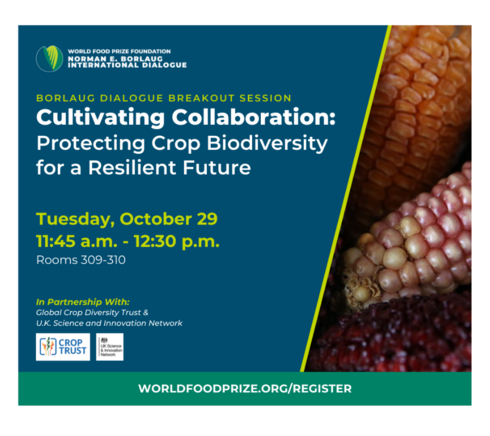 On Tuesday, the Crop Trust, in partnership with the U.K. Science and Innovation Network, held a Borlaug Dialogue side event on Cultivating Collaboration: Protecting Crop Biodiversity for a Resilient Future. This session underscored genebanks’ vital role as stewards of crop diversity and their contribution to tackling climate challenges and food insecurity worldwide.
On Tuesday, the Crop Trust, in partnership with the U.K. Science and Innovation Network, held a Borlaug Dialogue side event on Cultivating Collaboration: Protecting Crop Biodiversity for a Resilient Future. This session underscored genebanks’ vital role as stewards of crop diversity and their contribution to tackling climate challenges and food insecurity worldwide.
World Food Prize Laureate Geoffrey Hawtin opened the discussion by calling for deeper partnerships and greater investment to bridge the gap between conservation and the practical use of crop diversity. He pointed to the urgent needs of breeders in developing countries: “A huge effort needs to go into working with institutions in the global south to turn the conserved treasure house of diversity into something that can bring a true impact at the farm level.”
Nitya Rao, Director of the Norwich Institute for Sustainable Development, highlighted the often-overlooked role of women farmers as managers of crop diversity and the importance of their inclusion in breeding projects. Her collaborative project in Kenya, Egypt and Pakistan aims to integrate gender-based insights into wheat breeding.
“Working with communities, we find globally that most farms and most of the crop diversity are managed by women farmers. I think it's very exciting to try and start from a bottom-up approach in terms of gender and farmer preferences,” said Rao.
Adding a technological perspective, Ruth Bastow, Innovation Director at the UK Agri-Tech Centre, emphasized agritech’s expanding role in harnessing crop diversity for food production and ecosystem benefits, such as carbon capture. Meanwhile, Paul Schickler, Retired President of DuPont Pioneer, highlighted the private sector’s reliance on genebanks to develop crop traits resilient to shifting climates.
Together, the speakers underscored the importance of aligning R&D, policy, and private sector engagement, with genebanks at the center of a resilient, inclusive food system capable of meeting global challenges.
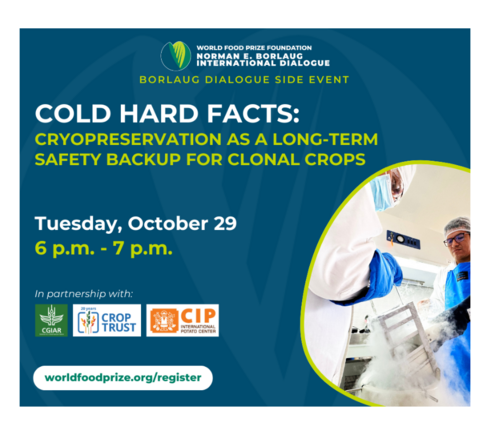 Later in the day, the Crop Trust also co-organized a side event with CGIAR and the International Potato Center (CIP) on The Cold Hard Facts: Clonal Crops and the Case for Cryopreservation as a Long-term Safety Backup. Highlighting potato, cassava, and bananas, the session emphasized that these crops cannot be backed up in traditional seedbanks like the Svalbard Global Seed Vault and instead require advanced cryopreservation methods. The event introduced the concept of a Latin American cryopreservation hub to protect crop biodiversity and ensure long-term food security for future generations by safeguarding crucial root, tuber, and banana crops.
Later in the day, the Crop Trust also co-organized a side event with CGIAR and the International Potato Center (CIP) on The Cold Hard Facts: Clonal Crops and the Case for Cryopreservation as a Long-term Safety Backup. Highlighting potato, cassava, and bananas, the session emphasized that these crops cannot be backed up in traditional seedbanks like the Svalbard Global Seed Vault and instead require advanced cryopreservation methods. The event introduced the concept of a Latin American cryopreservation hub to protect crop biodiversity and ensure long-term food security for future generations by safeguarding crucial root, tuber, and banana crops.
Executive Director of the Crop Trust Stefan Schmitz put the session into context: “About 20 percent of edible plants cannot be conserved as seeds at -18 degrees C. For this 20 percent, for example potatoes, you either need to keep it in fields, in vitro [as plantlets], or the third option is cryopreservation – stored at -186 degrees C in liquid nitrogen. This cryopreservation is incredible, efficient and safe. The only thing is, it requires a larger up-front investment.”
This was strengthened in opening remarks by Geoffrey Hawtin, who underscored challenges of cryopreservation. Charlotte Lusty, Senior Director of Genebanks at the CGIAR Genebank Initiative, explored this further. “There are many elements to making this a success. It’s the liquid nitrogen supply, it’s your workflow, it’s the clean plant material being available, it’s the protocols when working on a diversity of accessions and it's having the staff in place and enabled to do the job,” she said.
CIP brought practical experience to the session. Vania Azevedo, Head of Genebank at the Center, and Cryopreservation Specialist Rainer Vollmer showed how this can be done at scale by sharing the work of the Latin American Cryopreservation Network. Discussion touched on how to attract potential funders through sharing materials back to farmers. Much of this crop diversity is drought resistant and has never been conserved in collections before, so it offers a potential climate change solution.
Charlotte Lusty summarized the success of CIP and what it means moving forward, saying, “This is a revolution. They’ve proven it’s possible to get 400 accessions per year into a cryobank and now we can walk around with a tank instead of a field full of plants.”
Wednesday, 30 October - Celebrating Crop Diversity Heroes
On Wednesday morning, Crop Trust Executive Director Stefan Schmitz opened the Borlaug Dialogue with two numbers that underscored the urgency of today’s food security challenge. First, the number 735 million. This is the number of people who go to bed hungry each night, one in 11 people globally and one in five in Africa. Then, the number six. This is the number of years we have to achieve the UN Sustainable Development Goal #2: Zero Hunger.
He emphasized crop diversity as a solution: “Crop diversity is our common agricultural heritage. It is one of our most important global public goods. The underlying diversity is a treasure trove that researchers and plant breeders can tap into in search of the right genetic traits for new varieties that are more resilient to climate stress, more tolerant to pests and diseases, produce higher yields, have lower fertilizer and pesticide requirements and, last but not least, higher nutritional value.”
“More than ever, crop diversity offers a lifeline to better nutrition and our survival as a species in a time defined by climate change and environmental degradation. We must secure this lifeline now – and can do so with the right investments and innovations,” he continued.
He then outlined two investments that are key to unlocking this potential solution – funding genebanks through the Crop Trust and using crop diversity to innovate new kinds of crops. These crops are adapted to climate change or can help mitigate emissions by sequestering carbon in roots systems or reducing methane emissions from cattle. Schmitz concluded the speech with a strong call to action to collaborate, invest in crop diversity and work together to secure the future of food, forever.
After Dr. Schmitz’s opening words, the spotlight shifted to a moving Live with the Laureates event, hosted by Forbes’ Food and Environment Journalist, Daphne Ewing-Chow.
Ewing-Chow interviewed the two Laureates about their life-long work as crop diversity heroes and recalled their achievements and milestones. “You have dedicated your lives to something so much bigger,” she said applauding their boldness, courage and humility.
Hawtin and Fowler spoke about important lessons learned from the Vavilov Institute in Saint Petersburg, where genebank staff gave up their lives to save seeds.
“The least we can do is to conserve this diversity. Where we have to go now is to think of what we’re doing not simply as taking care of the production demands of the major staple crops but address issues such as childhood stunting, which are not issues of calorie intake but of dietary deficiencies. That requires us – particularly in an age of climate change – to conserve this diversity of crops so that we have options for the future,” shared Fowler.
This speaks to the thinking behind the Vision for Adapted Crops and Soils (VACS) initiative.
Seeds hold solutions, said Ewing-Chow recalling Schmitz and Hawtin’s Devex op-ed, which came out as the world suffered through some of the highest temperatures to date. “We’re going to have to produce crops which can grow under those radically different conditions that continue to evolve. How can you come up with that drought resistance without the diversity?” asked Hawtin.
Both Fowler and Hawtin have deep ties to the Svalbard Global Seed Vault and have since its inception. Mentally tracing his steps through its icy corridors, among the towering shelves with seed boxes from North Korea to Ukraine, Fowler emphasized that the Global Seed Vault safeguards “our common history” and that these crops co-evolved with us.
Ewing-Chow wrapped up the conversation by asking the Laureates for a call to action to ignite the audience as advocates for genebanks.
Hawtin lamented the lack of global passion for crop diversity on which the future of humanity depends. “At the moment, if a government gives money to a genebank, there’s very little political capital in that. There’s not a groundswell of support and applause from the general public. If it becomes seen as part of biodiversity loss in general, that situation might be different.”
Fowler concluded with words of encouragement for aspiring crop diversity heroes: “We underestimate the power we all have to start conversations and inform our governments about what’s important.”
Wednesday wrapped up with the 20th Anniversary Food Forever Experience held in partnership with Chef’s Manifesto. This five-course dinner put opportunity crops on the menu, prepared by chefs Erik Oberholtzer, Asha Gomez and Anthony Nace. Creative preparations of amaranth, pigeon pea, fonio, okra and pumpkin delighted attendees. The two World Food Prize laureates teamed up again to talk about the early years of the Crop Trust and Stefan Schmitz discussed how to achieve success for the Crop Trust Food Forever: Strategic Plan 2030 and beyond.
Thursday, 31 October - Focus on the Future
On Thursday, the Crop Trust organized a breakout session with the World Vegetable Center (WorldVeg) that discussed A Global Vegetable Biodiversity Plan: Securing a More Nutritious and Resilient Future.
 Dr. Maarten van Zonneveld, Genebank Manager at WorldVeg, underscored the need for a rescue plan: “Vegetables are a major part of the solution to ensure global food security. There are over 1,000 different vegetable species, but less than 10% of genebank accessions globally are vegetables. There is a lot of diversity not conserved in genebanks. And vegetable biodiversity is declining in fields and in the wild.”
Dr. Maarten van Zonneveld, Genebank Manager at WorldVeg, underscored the need for a rescue plan: “Vegetables are a major part of the solution to ensure global food security. There are over 1,000 different vegetable species, but less than 10% of genebank accessions globally are vegetables. There is a lot of diversity not conserved in genebanks. And vegetable biodiversity is declining in fields and in the wild.”
A panel discussion followed and featured Cary Fowler, who spoke to the need for conservation and collaboration: “The scarcest resource we have are the genetic resource collections of these [vegetable] crops in Africa. We can talk all day about adaptation, but if we don’t have that basic raw material for plant breeding, then we cannot succeed.”
“We should be working with the Secretariat of the International Plant Treaty because many of these crops are not listed in the Annex for access and benefit sharing. We need to work with the Treaty to make sure we have an enabling policy and legal environment,” Fowler continued.
The panelists discussed how to rescue this crop diversity and why it is essential. Crop Trust Director of Programs Sarada Krishnan outlined steps to increase vegetables conserved in genebanks – identify gaps in collections, build capacity of genebanks, characterize materials to look for desirable traits, develop seed systems and markets.
Chutchamas Kanchana-udomkan, Director of the Tropical Vegetable Research Center in Thailand, shared that food is a fundamental part of culture and crop improvement cannot be done without genebanks. The Alliance of CIAT and Bioversity International Genebank Manager Peter Wenzel said there needs to be encouragement for healthier diets, with Enoch Achigan-Dako of the University of Abomey-Calavi in Benin agreeing that vegetables are an important provider of nutrients and incomes.
This busy week concluded with the World Food Prize Laureate Award Ceremony, held in the Iowa State Capitol Building. This formal event recognized the two laureates, their legacies and ongoing contributions to global food security.
“When I encountered crop diversity and realized how important that was to the future of the world and food security, it didn't seem out of place to somehow try to create a global system for conserving it in perpetuity,” shared Fowler in his acceptance speech.
“We still have work to do to conserve wild relatives of crops, clonally reproduced crops, and we also have a huge way to go in raising the resources needed to do this. Once we've done that, and this is very doable, I think we will be able to sleep soundly at night knowing that the diversity that underpins agriculture today and will underpin agriculture in the future has been conserved so that our children and our grandchildren and our great-grandchildren will be able to live with a nutritious and healthy diet,” added Hawtin.
The Crop Trust congratulates Dr. Cary Fowler and Dr. Geoffrey Hawtin on this prestigious award. Your recognition is well deserved.
We also look forward to continuing collaboration with these two visionaries of crop diversity moving forward. Cary Fowler currently serves as Special Envoy for Global Food Security in the Office of Global Food Security for the United States Department of State, where he focuses on promoting opportunity crops, particularly in Africa. Much of the Crop Trust’s work is aligned with this important mission. Geoffrey Hawtin currently serves on the Executive Board of the Crop Trust. Under the leadership of the Board and current Executive Director Stefan Schmitz, the Crop Trust will continue to help secure the future of food, forever.

The Crop Trust was set up to finance and support genebanks and crop collections around the world. The Crop Trust currently has an Endowment Fund of about USD 300 million. The target figure that we're aiming at is around USD 850 million… With that amount, the offtake of that …would enable the fund to support genebanks around the world such that all of the critically important major crops would be conserved forever. And that means forever. That's the value of an endowment.
Categories: For The Press, For Partners, Food Security, Nutritional Security, English

